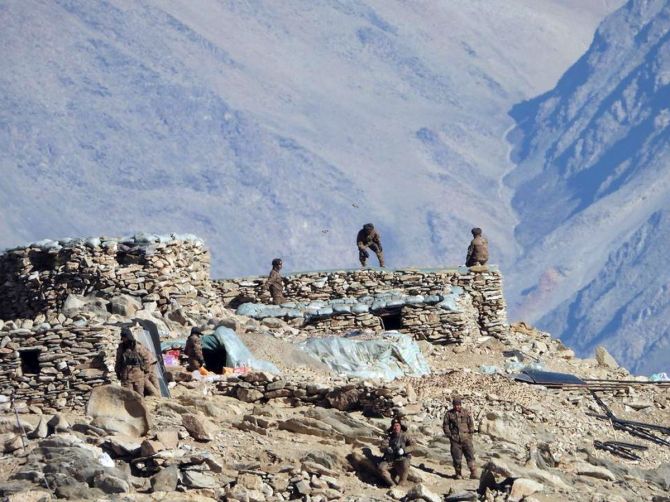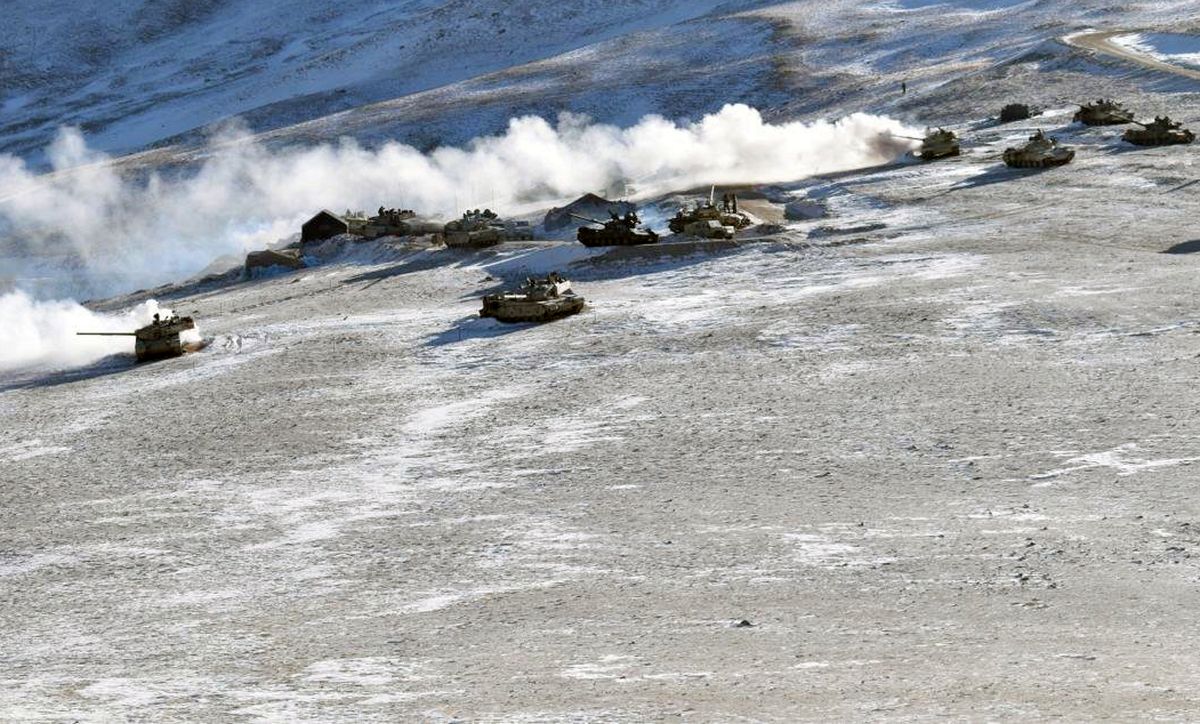'We must be careful because China has not given its design in Eastern Ladakh.'

"The Kailash heights are still within our reach, even today. We have always been going up to these areas even though we may not have taken up positions in the past. Even if we have come down a little, it does not make any difference. As long as you keep your vigilance up we should not have a problem," says Lieutenant General Sanjay Kulkarni PVSM, AVSM, SC, SM, VSM (retd).
General Kulkarni commanded a brigade and a division on the Line of Actual Control and was decorated with the Shaurya Chakra for leading his platoon to unfurl the Tricolour in Bilafondla on the Siachen Glacier.
The general discussed the India-China disengagement in Ladakh with Rediff.com's Archana Masih.
What are your thoughts on the disengagement that has been brought about?
It has to happen on our terms -- to restore the status quo ante pre-April 2020.
If the Chinese are willing to accept that then everything can move forward. But if the Chinese are not willing to status quo ante, the situation is going to remain like it has for the last 10 months.
It is a good sign that they are willing to step back from the northern and southern bank of Pangong Tso in phase I -- and then subsequently from other friction points like Gogra, Depsang.
We have had a bad experience with them during the disengagement in Galwan which resulted in the death of 20 soldiers including the commanding officer on our side and 45 PLA troops.
Our troops had gone to verify the disengagement process and encountered a premeditated fight with Chinese troops. Despite that bitter experience, India continued talks with China.
The occupation of the Kailash heights by Indian troops came as a big advantage to us. Both the countries are close to the range and it was just a close call about who got there first.
We trumped them by getting to the top about half an hour before they could. That was tremendous and jolted the PLA.
Our occupation of the Kailash heights made the PLA presence at Finger 4, 5, 6, 7, 8 redundant. Their occupation of Spanggur Gap and presence at Moldo is of no consequence because Indian troops were overlooking those areas.
The Chinese would have thought that they have pulled and pushed too far and the Indians are prepared militarily.
Neither of us wants to go to war and disrupt the peace and tranquillity. India made great effort to ensure peace on the LAC by using its military, diplomatic and economic options.
India virtually had a mirror mobilisation at LAC. It continued diplomatic engagements with China. It applied economic pressure by banning certain apps and Chinese goods.
In the international sphere, America, Australia, Japan and India came together under Quad to take on China in the Indian Ocean and South China Sea.
The world was also upset with China because people attributed the origin of the pandemic to Wuhan.
All these factors put the Chinese on the back foot.
India has also generated a lot of goodwill by providing the Covid vaccine as a gift to poor countries.
China found itself at odds with all the democracies. It was isolated. So it was a win-win situation for India, and for China.
One must also keep in mind that this is happening in the background of the centenary celebrations of the Communist party of China in 2021 -- and India being elected to the UN Security Council for two more years.
China would have thought that it has conveyed what it wanted to convey. We must be careful because China has not given its design in Eastern Ladakh.
They wanted an honourable exit and for pre 2020 status quo, India would have to vacate the Kailash heights.
Why did India have to vacate the Kailash heights when it had a position of advantage?
These heights are still within our reach, even today. We have always been going up to these areas, even though we may not have taken up positions in the past.
Even if we have come down a little, it does not make any difference. As long as you keep your vigilance up we should not have a problem.
The Chinese saw an honorable exit by pulling back to Finger 8. We have pulled back to our camp at Dhan Singh Thapa post which is around Finger 3.
There is no motorable road between Finger 3 and Finger 4, but there is a motorable road from the Chinese side to Finger 4.
Pre-April 2020, Indian patrols were walking to Finger 8 and the Chinese were coming in vehicles to Finger 4.
As a result, the agreement is that they will not venture beyond Finger 8 and we will not venture beyond Dhan Singh Thapa post.
These areas will remain no patrolling zones till the final call is taken.
After a longstanding standoff, there is always a give and take between two countries. Why in your opinion did India not insist on a Chinese withdrawal from say Depsang as a quid pro quo?
If we had said that we are vacating the Kailash heights and in turn you vacate Depsang, then all other friction points would remain as they are and we would have only achieved a Chinese withdrawal from Depsang.
We know these areas of Gurung Hill, Rezang La etc very well because we have been patrolling these areas. At the same time, all these features are in our line of sight.
From the other side of Chushul, we can see all these features; if anyone walks on them they can be spotted from miles.

Do you think the Chinese are serious about their intent to disengage?
The agreement indicates that disengagement will be in phases. Phase 1 is north and south of Pangong Tso to restore status quo ante.
It gives some indication that the Chinese are serious because previously China was not known to be walking the talk which made us think that what they perceive about us is not true.
Secondly, it could also be a smoke screen that they got India out of the Kailash range and themselves went back to Finger 8.
The Chinese were not gaining anything by occupying Finger 4, 5, 6, 7, 8 as long as we were occupying the Kailash heights because the Chinese troops were right under our nose.
Thirdly, they may have thought it is best to take a tactical pause and get back. After completion of Phase 1, we will know what lies hereafter.
The agreement says that 48 hours after the completion of Phase 1, the corps commander level talks will take place which will then pave the way for phase 2, 3, 4 and all other friction points that are involved like Hot Springs, Gogra. Depsang, Galwan etc.
They will decide whether Depsang will be priority one or two -- or if they will take up all friction points together.
The Chinese intent seems positive because they have demolished bunkers, pulled back heavy vehicles, dismantled helipads and jetties.
Let's hope the Chinese are really wanting good cordial relations because India has made it clear that bilateral relations would depend on the Chinese behaviour along the LAC.
If seen in this context, I think it is a positive sign and will ease the eyeball to eyeball confrontation. The peak of winter is starting now and will continue till April-May.
China will also have its own compulsions to reduce tensions because their soldiers are conscripted and come from mainland China thousands of miles away.
Also in July, they will celebrate 100 years of the Chinese Communist party.
Additionally, the new Biden administration is equally vocal and assertive about China and has not deviated from Trump's policies on China.
So nothing really seems to have gone China's way. World opinion has gone against China. The few countries that are with them are dependent on them for aid.
Democracies world over feel that China has bitten more than it can chew.
In this background, the present disengagement is a win-win situation for China and also for us.
Feature Presentation: Aslam Hunani/Rediff.com










